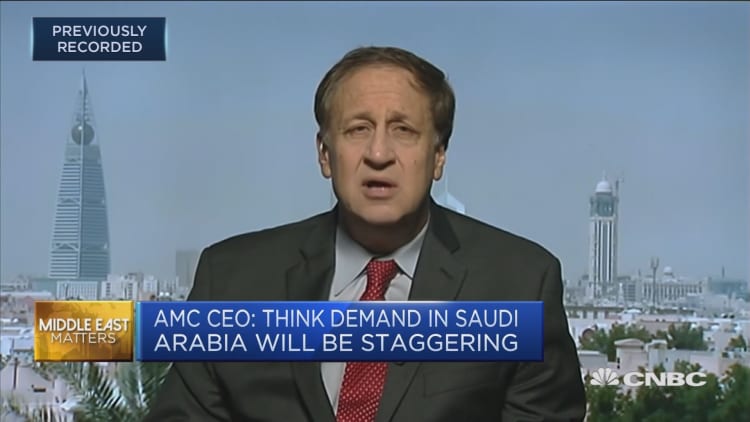
Saudi Arabia opened its first movie theater in 35 years on Wednesday, with Marvel's "Black Panther" the first movie shown publicly in the kingdom in decades.
The superhero blockbuster was shown at a new cinema theater built by U.S.-based AMC Entertainment in the King Abdullah Financial District in Riyadh.
AMC Chief Executive Adam Aron told CNBC ahead of the opening of the theater that it was an historic day for the movie industry and Saudi Arabia.
"This is quite a historic day in the country of Saudi Arabia, and AMC received the first license to operate movie theaters in this country two weeks ago, and we open tonight," he told CNBC's Hadley Gamble in Abu Dhabi.
"We heard that the kingdom of Saudi Arabia was thinking about lifting its ban on movie theaters, and we rushed in," he said.
Saudi Arabia's Ministry of Culture and Information announced in early April that it granted the first cinema operating license to AMC, the largest theatrical exhibitor in the world with approximately 1,000 theaters and 11,000 screens across the globe.
Plans for up to 40 theaters
AMC plans to open up to 40 cinemas in 15 cities in Saudi Arabia over the next five years, and a total of 50-100 cinemas in approximately 25 Saudi cities by 2030.
Aron told CNBC that the company hopes for a 50 percent market share in Saudi Arabia, and its 40 theaters in Saudi Arabia could account for 5 to 10 percent of the company's revenue and profit generation.
Saudi Arabia has a population of 32 million people, with the majority under the age of 30, offering entertainment companies like AMC a mass market eager to consume Western media and culture.
"We think there is enormous pent-up demand to go and see a movie in a theater, to watch movies the way they're supposed to be seen, on the big screen" Aron said.
"Saudis see movies right now, they love movies, but they watch them at home, they stream them, or they travel outside the kingdom to see movies," he said, predicting "staggering" demand in the country.
Aron explained that the popularity of "Black Panther" in the United States informed the company's decision to make it the debut movie for Riyadh on Wednesday evening.
He added that the Saudi government had already approved films to follow "Black Panther," including "Rampage" and an approved a cut of "The Avengers."
Religious shutdown in the '70s
Cinemas were common in Saudi Arabia up to the 1970s but were shut down by clerics in the following decades with theaters seen as an un-Islamic leisure activity in the religious, conservative kingdom.
Asked whether Western films could be modified to cater to strict local rules, Aron said it was likely.
"Films are slightly edited and modified to reflect sensitivity to the local culture here in the region. But even with those modest edits — you can imagine what they are, sexuality and nudity are out — but we believe that those edits will be quite modest," he said.
The reopening of cinemas in the kingdom comes as part of social reforms being promoted by Crown Prince Mohammed Bin Salman. The promotion of culture and entertainment are also a part of his "Vision 2030," a program to transform the country's economy and society.
The kingdom hopes to have nearly 350 cinemas, with over 2,500 screens, by 2030.
AMC's license was granted after it signed a memorandum of understanding with the entertainment arm of Saudi's main sovereign wealth fund, the Public Investment Fund, in December 2017 "to explore potential trade cooperation opportunities."


